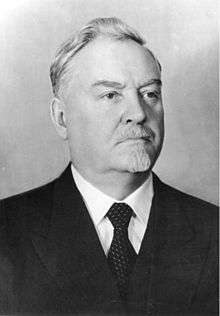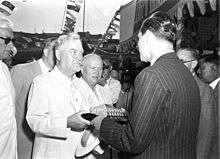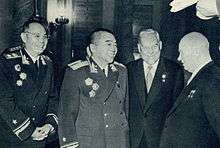Nikolai Bulganin
Nikolai Alexandrovich Bulganin (Russian: Никола́й Алекса́ндрович Булга́нин; 30 May [O.S. 17 May] 1895 – 24 February 1975)[1] was a Soviet politician who served as Minister of Defense (1953–1955) and Premier of the Soviet Union (1955–1958) under Nikita Khrushchev, following service in the Red Army and as defence minister under Joseph Stalin.
Nikolai Bulganin | |||||||||||||||||||||||||||||||||||||||||||||||
|---|---|---|---|---|---|---|---|---|---|---|---|---|---|---|---|---|---|---|---|---|---|---|---|---|---|---|---|---|---|---|---|---|---|---|---|---|---|---|---|---|---|---|---|---|---|---|---|
Николай Булганин | |||||||||||||||||||||||||||||||||||||||||||||||
 | |||||||||||||||||||||||||||||||||||||||||||||||
| Chairman of the Council of Ministers of the Soviet Union | |||||||||||||||||||||||||||||||||||||||||||||||
| In office 8 February 1955 – 27 March 1958 | |||||||||||||||||||||||||||||||||||||||||||||||
| First Deputies | Anastas Mikoyan Mikhail Pervukhin Maksim Saburov Joseph Kuzmin Lazar Kaganovich | ||||||||||||||||||||||||||||||||||||||||||||||
| Preceded by | Georgy Malenkov | ||||||||||||||||||||||||||||||||||||||||||||||
| Succeeded by | Nikita Khrushchev | ||||||||||||||||||||||||||||||||||||||||||||||
| Minister of Defence Union of Soviet Socialist Republics | |||||||||||||||||||||||||||||||||||||||||||||||
| In office 15 March 1953 – 9 February 1955 | |||||||||||||||||||||||||||||||||||||||||||||||
| Premier | Georgy Malenkov | ||||||||||||||||||||||||||||||||||||||||||||||
| Preceded by | Aleksandr Vasilevsky Nikolai Kuznetsov | ||||||||||||||||||||||||||||||||||||||||||||||
| Succeeded by | Georgy Zhukov | ||||||||||||||||||||||||||||||||||||||||||||||
| |||||||||||||||||||||||||||||||||||||||||||||||
| Personal details | |||||||||||||||||||||||||||||||||||||||||||||||
| Born | Nikolai Alexandrovich Bulganin (Никола́й Алекса́ндрович Булга́нин) 30 May 1895 Nizhny Novgorod, Russian Empire | ||||||||||||||||||||||||||||||||||||||||||||||
| Died | 24 February 1975 (aged 79) Moscow, Russian SFSR, Soviet Union | ||||||||||||||||||||||||||||||||||||||||||||||
| Resting place | Novodevichy Cemetery, Moscow | ||||||||||||||||||||||||||||||||||||||||||||||
| Citizenship | Soviet | ||||||||||||||||||||||||||||||||||||||||||||||
| Nationality | Russian | ||||||||||||||||||||||||||||||||||||||||||||||
| Political party | Russian Communist Party (1917-1960) | ||||||||||||||||||||||||||||||||||||||||||||||
| Awards | |||||||||||||||||||||||||||||||||||||||||||||||
| Military service | |||||||||||||||||||||||||||||||||||||||||||||||
| Allegiance | |||||||||||||||||||||||||||||||||||||||||||||||
| Branch/service | Red Army | ||||||||||||||||||||||||||||||||||||||||||||||
| Years of service | 1941–1958 | ||||||||||||||||||||||||||||||||||||||||||||||
| Rank | Marshal of the Soviet Union (1947-1958) | ||||||||||||||||||||||||||||||||||||||||||||||
| Commands | Soviet Armed Forces | ||||||||||||||||||||||||||||||||||||||||||||||
| Battles/wars | World War II | ||||||||||||||||||||||||||||||||||||||||||||||
Early career
Bulganin was born in 1895 in Nizhny Novgorod, the son of an office worker. The family was of Russian ethnicity.[2] He joined the Bolshevik Party in 1917 and was recruited in 1918 into the Cheka, the Bolshevik regime's political police, where he served until 1922. After the Russian Civil War, he became an industrial manager and worked in the electricity administration until 1927. He was director of the Moscow electricity supply in 1927–1931. In 1931–1937, Bulganin was chairman of the executive committee of the Moscow City Soviet.
In 1934, the 17th Congress of the Communist Party elected Bulganin a candidate member of the Central Committee. A loyal Stalinist, he was promoted rapidly as other leaders fell victim to Joseph Stalin's Great Purge of 1937–38. In July 1937, he was appointed Prime Minister of the Russian Republic (RSFSR). He became a full member of the Central Committee later that year and, in September 1938, became Deputy Prime Minister of the Soviet Union and head of the State Bank of the USSR.
World War II
During World War II, Bulganin played a leading role in the government and Red Army, although he was never a front-line commander. He was given the rank of Colonel-General and was a member of the State Defense Committee. He was appointed Deputy Commissar for Defence in 1944 and served as Stalin's principal agent in the High Command of the Red Army. In 1947, he became Minister for the Armed Forces and was promoted to the rank of Marshal of the Soviet Union. He also became a candidate member of the Politburo of the Communist Party. He was again Deputy Prime Minister of the Soviet Union, under Stalin, from 1947 to 1950. In 1948, he became a full member of the Politburo.
Premiership
After Stalin's death in March 1953, Bulganin moved into the first rank of the Soviet leadership, being appointed to the key post of Defense Minister. He was an ally of Nikita Khrushchev during his power struggle with Georgy Malenkov, and in February 1955 he succeeded Malenkov as Premier of the Soviet Union.[3] He was generally seen as a supporter of Khrushchev's reforms and destalinisation. He and Khrushchev travelled together to India, Yugoslavia and Britain, where they were known in the press as "the B and K show."[4] In his memoirs, however, Khrushchev recounted that he believed that he "couldn't rely on [Bulganin] fully."[5]

During the Suez Crisis of October–November 1956, Bulganin sent letters to the governments of the United Kingdom, France, and Israel threatening rocket attacks on London, Paris, and Tel Aviv if they did not withdraw their forces from Egypt. In a letter to Israeli prime minister David Ben-Gurion, Bulganin wrote, "Israel is playing with the fate of peace, with the fate of its own people, in a criminal and irresponsible manner; [...] which will place a question [mark] upon the very existence of Israel as a State."[6] Khrushchev, in his memoirs, admitted the threat was designed simply to divide Western opinion, especially since at the time he did not have enough ICBMs to launch the rockets, and in any case he had no intention of going to war in 1956.

By 1957, however, Bulganin had come to share the doubts held about Khrushchev's policies by the opposition group (which Khrushchev and his supporters labelled the "Anti-Party Group") led by Vyacheslav Molotov. In June, when the dissenters tried to remove Khrushchev from power at a meeting of the Politburo, Bulganin vacillated between the two camps. When the dissenters were defeated and removed from power, Bulganin held on to his position for a while, but in March 1958, at a session of the Supreme Soviet, Khrushchev forced his resignation.[3] He was appointed Chairman of the Soviet State Bank, a job he had held two decades before, but in September Bulganin was removed from the Central Committee and deprived of the title of Marshal. He was dispatched to Stavropol as Chairman of the Regional Economic Council, a token position, and in February 1960 he was retired on a pension.
Personal life
His wife was Elena Mikhailovna Korovina, an English teacher from a Moscow school. The couple had two children: son Leo and daughter Vera. Vera married the son of Admiral Kuznetsov.
Honours and awards
| Hero of Socialist Labour (10 June 1955) | |
| Orders of Lenin, twice (1931, 1955) | |
| Order of the Red Banner (1943) | |
| Order of Suvorov, 1st class (1945) and 2nd class (1943) | |
| Order of Kutuzov, 1st class, twice (1943, 1944) | |
| Order of the Red Star, twice (1935, 1953) | |
| Order of the Republic (Tuvan People's Republic, 3 March 1942) | |
| Grand Cross of the Virtuti Militari (Poland) | |
References
- Nikolay Aleksandrovich Bulganin (premier of Union of Soviet Socialist Republics) -- Encyclopædia Britannica:. Britannica.com. Retrieved on 2014-6-11.
- XPOHOC
- Powaski, Ronald E. (1997). The Cold War: The United States and the Soviet Union, 1917-1991. New York City: Oxford University Press. ISBN 0195078500.
- Pratt, Julius William (1965). A History of United States Foreign Policy. Upper Saddle River, New Jersey: Prentice Hall. p. 470. ISBN 978-0-13-392282-0.
- Khrushchev, Nikita (2006). Memoirs of Nikita Khruschev, Volume 2: Reformer (1945–1964). University Park, Pennsylvania: Pennsylvania State University Press. p. 238. ISBN 0271028610.
- "7 Exchange of Letters- Bulganin- Ben-Gurion- 5 and 8 November 1956". Ministry of Foreign Affairs (Israel).
External links
| Wikimedia Commons has media related to Nikolai Bulganin. |
Nikolai Bulganin at Find a Grave
| Political offices | ||
|---|---|---|
| Preceded by Joseph Stalin |
Minister of the Armed Forces 3 March 1947 – 24 March 1949 |
Succeeded by Aleksandr Vasilevsky |
| Preceded by Nikolai Kuznetsov |
Minister of Defense of the Soviet Union 15 March 1953 – 9 February 1955 |
Succeeded by Georgy Zhukov |
| Preceded by Aleksandr Vasilevsky | ||
| Preceded by Georgy Malenkov |
Premier of the Soviet Union 8 February 1955 – 27 March 1958 |
Succeeded by Nikita Khrushchev |
| Preceded by A. P. Grichmanov |
Chairman of Board of the Soviet State Bank 1938–1940 |
Succeeded by N. K. Sokolov |
| Preceded by N. K. Sokolov |
Chairman of Board of the Soviet State Bank 1940 |
Succeeded by Ya. I. Golev |
| Preceded by Vasili Popov |
Chairman of Board of the Soviet State Bank 1958 |
Succeeded by A. K. Korovushkin |